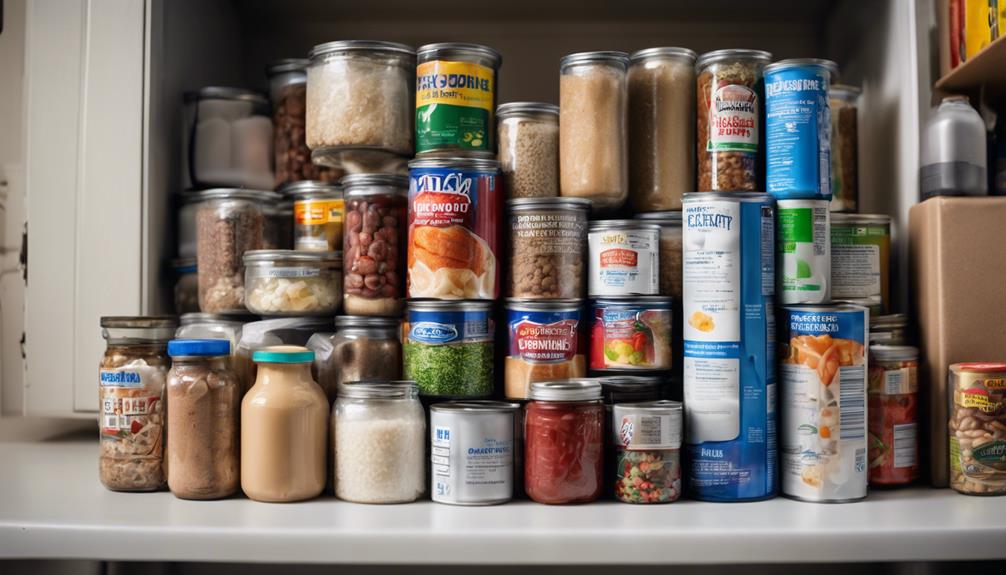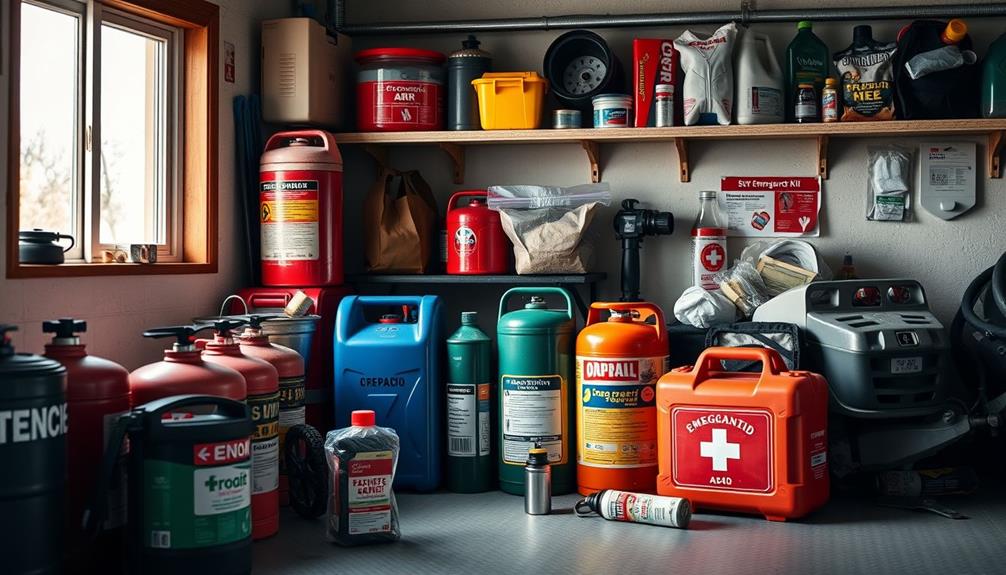I know staying warm when the grid fails is a critical concern. I've prepared by learning essential survival skills like fire-making and shelter building. Using off-grid heating solutions like rocket stoves guarantees I can cook and stay warm even without electricity. I also gather free fuel sources like wood scraps and fallen branches, which are handy. Being part of a community helps too; we share resources and skills that boost our resilience. With these strategies, I feel more secure about facing potential grid failures. There's a lot more I've discovered that can help enhance my preparedness. I also recognize the importance of first aid and medical knowledge as essential survival skills. In the event of a grid failure, access to medical care may be limited, so knowing how to address common injuries and illnesses is crucial. Additionally, I’ve made sure to stock up on necessary supplies like food, water, and medication so that I can be self-sufficient for an extended period of time. By continually expanding my knowledge and preparing for various scenarios, I am confident in my ability to adapt and thrive in challenging situations.
Key Takeaways
- Having off-grid heating solutions, like rocket stoves, ensures warmth and cooking capabilities during a grid failure.
- Learning essential survival skills, such as fire-making and shelter building, enhances your ability to stay warm.
- Utilizing free fuel sources, such as wood scraps and fallen branches, provides reliable heating options when traditional energy sources fail.
- Community support strategies, like resource sharing and skill-sharing groups, can help keep everyone warm and prepared during crises.
Risks of Grid Failure
When I consider the risks of grid failure, it's clear that the potential for catastrophic events like a solar storm or cyberattack poses a serious threat to our daily lives.
NASA reports a 12% chance of a Carrington-level event occurring within this decade, which could disrupt our entire electrical infrastructure. I can't ignore the near miss in July 2012 that nearly resulted in a long-term grid failure.
Other threats like cyber warfare and natural disasters further compound my concerns. Historical examples show that when infrastructure collapses, society can regress considerably.
I find it alarming that public service announcements often go unnoticed, leaving many unprepared for such scenarios. We need to recognize these risks and take them seriously to safeguard our future.
Importance of Preparedness
Preparedness is essential for steering through the uncertainties of a grid failure, and I believe proactive measures can greatly enhance our chances of survival.
I've come to realize that simply having supplies isn't enough; it's about developing skills and knowledge that truly matter. Understanding how to manage resources efficiently can make a significant difference during a crisis.
I also value community support, as sharing knowledge and resources fosters resilience. It's vital to prioritize smarter preparation techniques, focusing on what'll help us work less and survive longer.
By investing time in learning how to adapt, I feel more equipped to handle any challenges that arise when the grid goes down.
Preparedness isn't just a mindset; it's a lifestyle choice.
Off-Grid Heating Solutions

Understanding the importance of resource management naturally leads me to explore off-grid heating solutions that can keep us warm and safe during a grid failure.
I've found several options that serve this purpose effectively:
- Rocket stoves for efficient heating and cooking.
- Silverfire Hunter stove, perfect for small spaces.
- TLUD stoves that burn various biomass for fuel flexibility.
- Mini 2 Liter Dragon Pot for versatile cooking needs.
Each of these solutions not only provides warmth but also supports my overall preparedness strategy.
Investing in quality equipment like these guarantees I'm ready for whatever challenges come my way when the grid fails.
Essential Survival Skills
Acquiring essential survival skills empowers me to navigate challenging situations with confidence and resilience. I focus on learning practical techniques that enhance my self-sufficiency and resourcefulness. Skills like fire-making, foraging, and basic first aid are critical. Here's a quick overview of some significant skills and their benefits:
| Survival Skill | Benefits |
|---|---|
| Fire-Making | Provides warmth and cooking |
| Foraging | Access to food in the wild |
| Shelter Building | Protection against elements |
| First Aid | Treats injuries and ailments |
Free Fuel Sources

I often find that local cabinet shops and construction sites can be great sources for free wood scraps, which can be invaluable for fuel in emergencies.
I've learned to build connections with foremen and store owners, who often let me collect leftover pieces. Storing these dry wood scraps guarantees I'm prepared when the power goes out.
Here are some other free fuel sources I've come across:
- Fallen branches and dead trees in my area
- Pallets from warehouses or stores
- Used paper and cardboard from home
- Old furniture that's no longer needed
Efficient Cooking Techniques
When the grid fails, mastering efficient cooking techniques becomes essential for survival and making the most of limited resources.
I've found that using wood scraps from local cabinet shops not only saves money but also provides a reliable fuel source. I often use a lightweight Economy Scout Stove; it's perfect for quick meals and easy to pack in my bug-out bag.
A few twigs or pine cones ignite quickly, and I can boil water or cook meals with minimal effort. I also keep fatwood on hand for fire starting.
This stove produces less smoke than traditional campfires, keeping my cooking discreet. By honing these skills, I guarantee I'm well-prepared to face any challenges that arise.
Community Support Strategies

Building a strong community network is essential for survival in grid-down situations, as collaboration enhances resource sharing and mutual support. I've seen firsthand how working together can make a difference.
Here are some strategies I focus on:
- Organizing local meet-ups to discuss preparedness and skills.
- Sharing resources like food, firewood, and tools during emergencies.
- Establishing communication channels for real-time updates and support.
- Creating skill-sharing groups to teach each other valuable survival techniques.
Frequently Asked Questions
What Are the Best Ways to Insulate My Home for Winter?
I've found that sealing gaps, adding weather stripping, and using heavy curtains greatly improve my home's insulation. I also use reflective insulation in attics and basements, boosting warmth during winter without excessive energy costs.
How Can I Keep Warm Without Electricity During a Grid Failure?
In a world turned icy, I embrace warmth like a flickering flame. I'll rely on my rocket stove, blankets, and creative heating methods, ensuring I stay cozy and resilient when the chill sets in.
What Types of Clothing Are Best for Cold Weather Survival?
For cold weather survival, I prioritize layering with thermal base layers, insulating mid-layers, and waterproof outer layers. I also choose materials like wool and fleece for warmth, ensuring I stay comfortable and protected against the elements.
How Can I Stay Informed During a Grid-Down Situation?
I stay informed during a grid-down situation by using battery-powered radios, solar chargers, and gathering information from local community groups. I also keep a stash of printed materials for essential updates and survival tips.
What Are the Signs of Hypothermia and How to Prevent It?
I recognize the shivers, the confusion, the exhaustion of hypothermia. I prevent it by layering clothing, staying dry, and keeping active. I monitor my body's signals and seek warmth before it becomes a serious issue.
Conclusion
As I reflect on the potential chaos a grid failure could bring, I realize that being prepared is my best defense.
With the right off-grid heating solutions, survival skills, and community connections, I can't only keep warm but also help others in need.
Isn't it comforting to know that, with a little planning and resourcefulness, we can weather any storm together?
In the face of uncertainty, I'm determined to stay resilient and ready for whatever comes our way.










